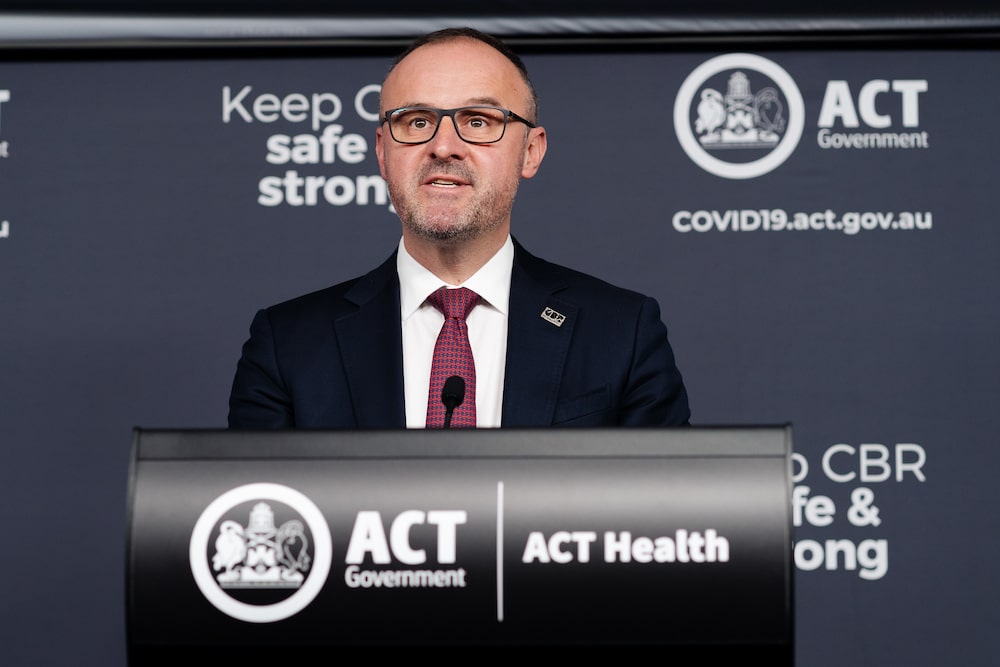
ACT Chief Minister Andrew Barr is advocating at a national level that as many 12- to 15-year-olds as possible are vaccinated against COVID-19 before “big, big decisions are made” around easing restrictions.
Mr Barr has taken numerous opportunities in his COVID-19 update press conferences this week to encourage all governments across Australia to increase efforts to vaccinate 12-15-year-olds with TGA approved vaccines once the supply is there.
“I would like to see a much higher rate of vaccination amongst that cohort,” he said.
Mr Barr said there was a point of contention around holding off on easing restrictions once the 70 and 80 per cent Doherty Institute vaccination targets have been reached by an extra “three to six weeks” to ensure 12-15-year-olds have received jabs.
“It’s three to six weeks extra vaccinating to protect our kids and to make sure that we are genuinely at 70 or 80 per cent, that’s what’s in dispute,” he said.
The Pfizer vaccine is currently TGA approved for those 12 years and older, while the Moderna mRNA vaccine is currently under review for use in Australia.
Australian children aged 12-15 who are considered high risk have been receiving the vaccine since earlier this month.
MCRI Research Brief finds ‘inconclusive evidence’
Mr Barr’s remarks come as a research brief published by the Murdoch Children’s Research Institute (MCRI) released last week found inconclusive evidence on whether vaccinating children aged 12-15 against COVID-19 prevents broader community transmission.
The COVID-19 vaccination for children & adolescents Research Brief, released 20 August, said there is currently insufficient data to know whether vaccinating children in that age bracket impacts their ability to transmit the virus.
“There are insufficient data to know if vaccinating children and adolescents will prevent spread in the household, schools or community,” it stated.
The brief pointed to the recent Doherty modelling report, which found that vaccinating those 16 years and above will have most impact on reducing transmission, and the incremental benefit of vaccinating those aged 12-15 years on preventing transmission was “minimal”.
“We do not know how vaccinating children and adolescents impacts their ability to transmit to others, or the extent to which the Delta variant is changing the disease burden in children and adolescents,” it stated.
In countries with high vaccine coverage in adults, unvaccinated people, including children and adolescents, carry the burden of COVID-19 infections, according to the brief.
“Even though the number of infections is greatest among children and adolescents in this situation, the burden of hospitalisations and deaths still remains greatest in older age groups,” it stated.
COVID-19 can cause infection in children and adolescents that requires care in hospital, although this is uncommon, and can rarely cause death; “Risk of death from COVID-19, even in those with medical conditions, is very low,” the brief read.
In the United States, of the 4,593,721 total child COVID-19 cases reported, roughly one per cent of children who are infected with the virus end up hospitalised, and 0.00-0.03 per cent die, according to the American Academy of Pediatrics.
The definition of child age ranges from 0-14 to 0-20 across states.
The brief does recommend continuing to vaccinate at-risk children and adolescents aged 12 years and older, and to consider vaccinating those aged 12-15 years “as soon as possible”.
“The data from clinical trials of Pfizer and Moderna suggest these vaccines are safe and efficacious,” it read.
Teens ‘important’ following school outbreaks

ANU Research Fellow at the National Centre for Epidemiology & Population Health, Dr Meru Sheel, endorsed the current vaccination strategy based on giving priority to high-risk groups and moving down the list.
“Vaccinating children is important, but it is not a limitation to vaccinating adult and elderly population,” she said.
Dr Sheel said the most important metric is achieving vaccination rates of 90 per cent plus in the highest risk groups based on age and co-morbidities.
“Not every adult will get as sick, age is a risk factor, but immunodeficiency is also a risk factor.”
Dr Sheel said adults, the elderly and the immunocompromised are more at risk of negative health outcomes should they contract COVID-19.
“We’re not seeing severe disease in children; we’re not seeing children hospitalised … There are children who are immunocompromised who will end up in hospital and who will die, sadly,” she said.
Dr Sheel said the discussion around vaccinating 12-15-year-olds is understandable given there is a concern about the school-based outbreaks in Canberra.
“It’s not clear if delta is more infectious in children at the moment,” Dr Sheel said. “What is really likely happening is delta is more transmissible, so more people are getting the disease.”
Currently, 38 per cent of the ACT’s 176 COVID-19 cases related to this outbreak are people aged under 17 years.
The MCRI brief said vaccination for teachers, early educators and school staff should be prioritised to “effectively protect children and adolescents in the community” and keep schools open.
“Studies are continually emerging that highlight the negative effects of the pandemic on the mental health of children and adolescents,” it stated.
“There have been substantial increases in admissions to paediatric hospitals for mental health, substance use and suicide attempts.”
The MCRI found prolonged school closures and lockdowns across the country exacerbate these impacts, differentially affecting those living with disadvantage, diminishing social mobility and negatively impacting future economic productivity.
Get all the latest Canberra news, sport, entertainment, lifestyle, competitions and more delivered straight to your inbox with the Canberra Daily Daily Newsletter. Sign up here.
For more news:


